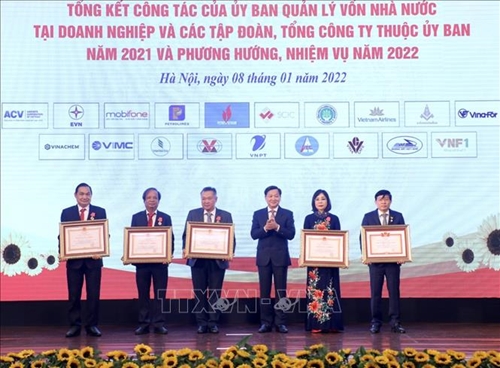The information was released at a conference to review the work in 2021 and deploy tasks in 2022 held on weekend in Hanoi by the commission.
    |
 |
|
Deputy Prime Minister Le Minh Khai addresses the conference. |
The 19 bodies earned total revenue of 821.3 trillion VND, equivalent to 99 percent of the annual plan and up by 8 percent compared to 2020.
The total amount of money they contributed to the State budget was 62.4 trillion VND, 27 percent higher than the whole year’s plan.
Thirteen out of 19 corporations and groups completed and exceeded the annual revenue plan. In contrast, six enterprises did not fulfil revenue targets, namely Vietnam Electricity (EVN), Vietnam Airlines (VNA); the Airports Corporation of Vietnam (ACV), the Vietnam Railways Corporation (VNR), the Vietnam National Coffee Corporation (Vinacafe) and Vietnam Southern Food Corporation (Vinafood 2).
There were 14 out of 19 groups and corporations that completed and exceeded the before-tax profit plans for the year; 14 completed and exceeded the budget payment plan; five achieved higher profits than annual plans and in 2020.
Among the group of five units achieving higher profits than planned, the Vietnam Oil and Gas Group (PetroVietnam) recorded 40.7 trillion VND in pre-tax profit, up by 139 percent of the yearly plan and up 105 percent over the same period of 2020.
Vietnam National Shipping Lines (Vinalines) recorded VNĐ2.9 trillion in consolidated pre-tax profit in 2021, up by 474 percent compared to 2020 and exceeding 204 percent of the annual plan.
At the Chemical Industry Group (Vinachem), profit before tax reached 1.73 trillion VND. In 2020, this group recorded a consolidated loss of up to 2.16 trillion VND. In 2021, the group planned to experience another loss of 1.22 trillion VND.
For the Vietnam National Oil and Gas Group (Petrolimex), the consolidated pre-tax profit last year was 3.82 trillion VND, up 171 percent over the previous year and exceeding 14 percent of the yearly plan.
    |
 |
|
Individuals receive first-class Labor Orders. |
At the conference, Deputy Prime Minister Le Minh Khai said that the CMSC and the 19 corporations have successfully implemented the “dual goals" of fighting the COVID-19 pandemic, while maintaining production and business activities, contributing to the recovery and socio-economic development of the whole country.
In 2022, Deputy Prime Minister requested the CMSC to strengthen its capacity, strengthen the inspection and supervision tasks, especially financial supervision and investment supervision.
He requested that the CMSC remove difficulties and reform administrative procedures, improve the investment and business environment to create the most favorable conditions for corporations to recover and develop production, to overcome negative impacts caused by the pandemic.
For the companies, the Deputy Prime Minister requested they conduct measures to prevent and control the COVID-19 pandemic to ensure safety for workers’ health and income, at the same time, strive to complete the highest level of the business plans in 2022; improve production and business efficiency; invest according to strategies and plans and in accordance with the market economic mechanism, to ensure efficiency and sustainable development.
CMSC Deputy Chairman Nguyen Ngoc Canh said the commission would continue to effectively handle outstanding loss-making projects that were behind schedule and inefficient, continue to accelerate the restructuring of State-owned enterprises, promote the process of equitization and rearrangement of enterprises under 19 groups and corporations.
Although recording positive business results in the context of the pandemic, CMSC leaders said that capital management activities at enterprises still had shortcomings and limitations.
This includes the settlement of a number of tasks that have not yet met the prescribed deadlines such as financial statements; the plan for profit distribution and setting up of funds in 2020; as well as corporate financial supervision reports.
The main reasons for the limitations and shortcomings were the CMSC's heavy workload, diversified fields, limited human resources, lack of experienced and qualified employees.
Source: VNA